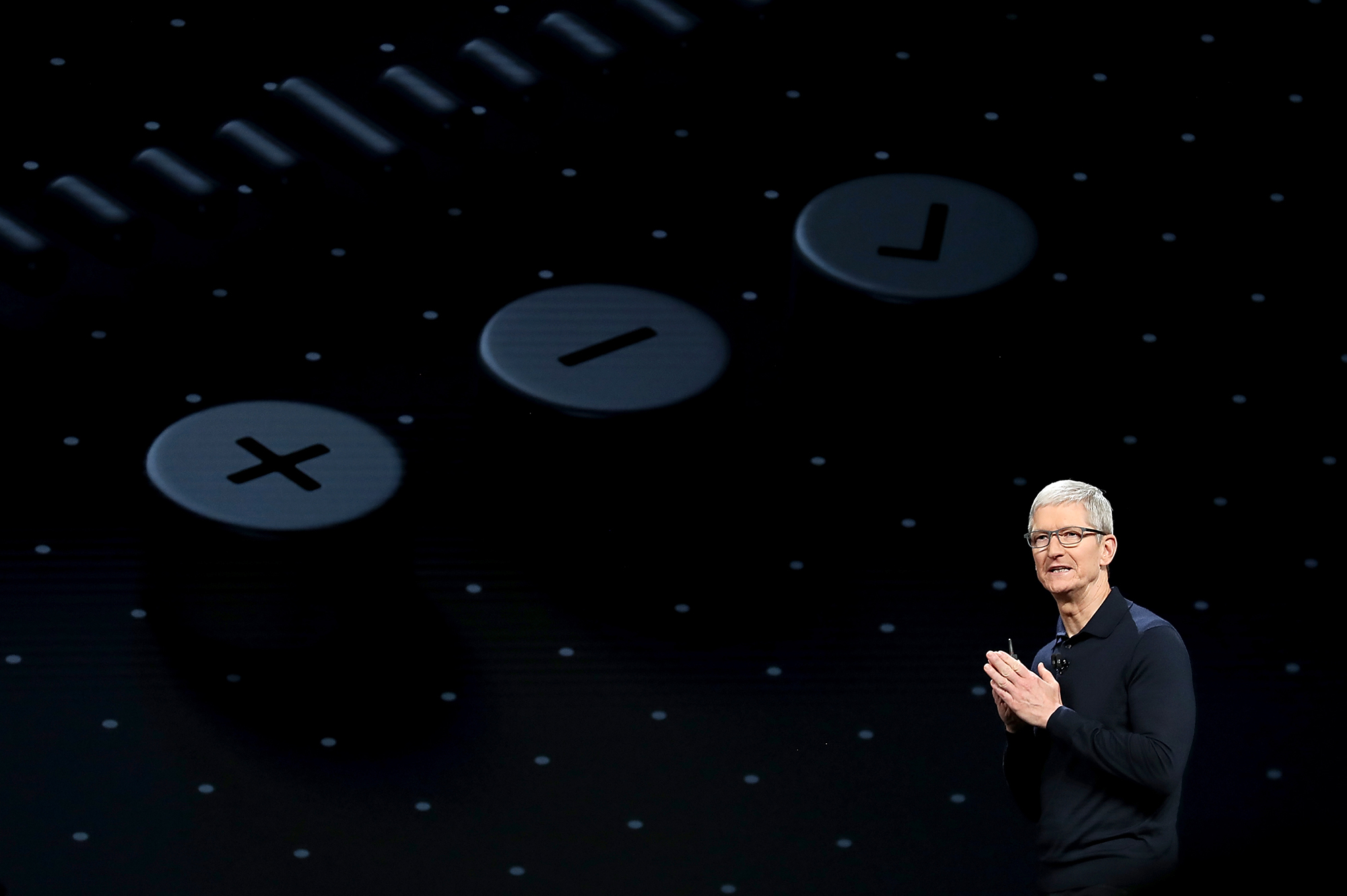Apple declares war on Google and Facebook
At WWDC, Tim Cook had one message: We're the only good guys in town


On Sunday, the day before Apple's Worldwide Developer Conference, news broke that Facebook was yet again embroiled in a privacy scandal. The New York Times reported that years ago, the social network made deals with smartphone makers to give them access to users' data. Though Facebook denied any wrongdoing, critics were quick to point out that, yet again, Facebook had to be forced to answer for its practices rather than simply coming clean.
When Apple's Tim Cook took the stage Monday for the WWDC conference keynote, it was into that context that he spoke. Faced with privacy scandals, concern about abuse and political interference, and worry about tech addiction, Silicon Valley is experiencing a backlash after being adored for years.
It was a significant moment, then, when Apple declared that its Safari browser on Mac would include new privacy features to stop users from being tracked — and demonstrated the feature by showing Facebook on screen. It was a clear broadside against the social network and a declaration of a war on its tech competitors. In fact, the entire tone of the WWDC keynote seemed like a response to the techlash, with Apple claiming that it alone is the company that consumers can really trust. Yet as Apple positions itself as the savior of tech, its own conflicts are also hard to ignore.
The Week
Escape your echo chamber. Get the facts behind the news, plus analysis from multiple perspectives.

Sign up for The Week's Free Newsletters
From our morning news briefing to a weekly Good News Newsletter, get the best of The Week delivered directly to your inbox.
From our morning news briefing to a weekly Good News Newsletter, get the best of The Week delivered directly to your inbox.
That didn't stop Apple from doing everything it could to prove it's an oasis in the tech world. The argument began at the outset of the presentation, with Apple SVP Craig Federighi claiming that the upcoming iOS 12, the software that runs iPhones and iPads, will not only focus extensively on performance, but rather than slowing older devices down, it will also work on products over five years old.
Particularly in light of the battery scandal that saw Apple throttling some older iPhones, it seemed like a clear response to the long-time criticism that the company fosters planned obsolescence to get users to upgrade to the latest gear. The company also took a shot at Google when it pointed out that, meanwhile, Android users upgrade to the newest software at a far lower rate, if they do at all. The message was clear: If you want your device to be supported for years after you first use it, buy Apple.
Similarly, new features in iOS 12 to help users limit their screen time, track which apps they use, and better control notifications appeared to try and address the concerns about tech addiction (though here Apple wasn't alone as Google announced similar features a few weeks earlier). Of particular note were new settings to help parents limits kids' screen times, which seemed like a direct answer to criticism made by two prominent Apple investors earlier this year that the company must do more to deal with the effect of its tech on children.
In that sense, Apple was continuing its long tradition of defining itself as a company more focused on the end user than any other. Years ago, Steve Jobs claimed Apple's purpose was to merge technology and the liberal arts; we are the human tech company, he implied, and the new privacy features that challenge Facebook and Google seem to be in that tradition. While other companies are making tools or gadgets, Apple insists it is making things to unleash creativity, or, more simply, that are just a pleasure to use.
A free daily email with the biggest news stories of the day – and the best features from TheWeek.com
In fact, pleasure was part of much of the earlier part of the digital revolution. When things like blogging, social media, smartphones, and apps were all new there was a kind of joy attached to the sheer novelty — this feeling that every few months, you were doing things that no one in history had done before.
Yet now with our feet firmly planted in the digital era, we see that such pleasure has a downside — that it's exactly the enjoyment of getting notifications or new updates that produces a compulsive, attention-sapping effect. There are also potential mental health effects from using social media born of a desire to compare ourselves to others or feel dissatisfied with our own lives.
For Apple to suggest it thus stands alone is bound to be an ambivalent claim. On the one hand, the new privacy features that starkly contradict Facebook and Google's approach of tracking users' data seems commendable. It establishes two distinct paths in tech, one user-centric and the other data-centric. On this point, Apple seems on the right side of history.
But Apple's other features that limit app time or control children's use seem a little more suspect. After all, it's precisely Apple's focus on producing appealing tech that is part of our occasionally troubled relationship to our devices. If Apple is doing anything, it is attempting to fix a problem of its own making.
Shortly after talking about its new iPhone capabilities to restrict attention, Apple turned to the Watch, and demonstrated new features that let a user view web content on their wrist, all while competing against friends in workouts on a stationary bike. It was a strange juxtaposition — just after announcing new features to help you use tech less, it introduced new ones to induce you to use tech more. This is precisely the problem: Tech is so indelibly part of our lives, we cannot help but avoid it, even as it may harm us or invade our privacy.
Apple's own confusion seems to point to the bind both it and we users find ourselves in: surrounded by technology, yet unable to decide whether it is friend or foe.
Navneet Alang is a technology and culture writer based out of Toronto. His work has appeared in The Atlantic, New Republic, Globe and Mail, and Hazlitt.
-
 ‘Jumping genes': How polar bears are rewiring their DNA to survive the warming Arctic
‘Jumping genes': How polar bears are rewiring their DNA to survive the warming ArcticUnder the radar The species is adapting to warmer temperatures
-
 January’s books feature a revisioned classic, a homeschooler's memoir and a provocative thriller dramedy
January’s books feature a revisioned classic, a homeschooler's memoir and a provocative thriller dramedyThe Week Recommends This month’s new releases include ‘Call Me Ishmaelle’ by Xiaolu Guo, ‘Homeschooled: A Memoir’ by Stefan Merrill Block, ‘Anatomy of an Alibi’ by Ashley Elston and ‘Half His Age’ by Jennette McCurdy
-
 Venezuela’s Trump-shaped power vacuum
Venezuela’s Trump-shaped power vacuumIN THE SPOTLIGHT The American abduction of Venezuelan President Nicolás Maduro has thrust South America’s biggest oil-producing state into uncharted geopolitical waters
-
 How do you solve a problem like Facebook?
How do you solve a problem like Facebook?The Explainer The social media giant is under intense scrutiny. But can it be reined in?
-
 Microsoft's big bid for Gen Z
Microsoft's big bid for Gen ZThe Explainer Why the software giant wants to buy TikTok
-
 Apple is about to start making laptops a lot more like phones
Apple is about to start making laptops a lot more like phonesThe Explainer A whole new era in the world of Mac
-
Why are calendar apps so awful?
The Explainer Honestly it's a wonder we manage to schedule anything at all
-
 Tesla's stock price has skyrocketed. Is there a catch?
Tesla's stock price has skyrocketed. Is there a catch?The Explainer The oddball story behind the electric car company's rapid turnaround
-
 How robocalls became America's most prevalent crime
How robocalls became America's most prevalent crimeThe Explainer Today, half of all phone calls are automated scams. Here's everything you need to know.
-
 Google's uncertain future
Google's uncertain futureThe Explainer As Larry Page and Sergey Brin officially step down, the company is at a crossroads
-
 Can Apple make VR mainstream?
Can Apple make VR mainstream?The Explainer What to think of the company's foray into augmented reality
